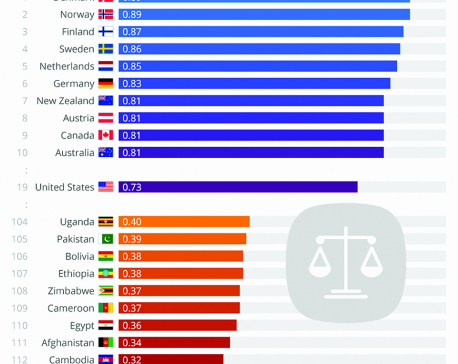
OR
Parliament out of business
Federal Parliament is set to be without business from this week even as it has become urgent to formulate a number of laws in accordance with the constitutional provisions. According to Ministry of Law, the parliament needs to pass at least 17 federal, 22 provincial and eight local laws to implement the provisions enshrined in the constitution. Formulation of the laws related to fundamental rights of citizens has become imperative as these laws must be endorsed by September 18 as per the constitutional provision. With regard to implementation of fundamental rights, the Article 47 of the constitution states that “…the State shall make legal provisions, as required, within three years of the commencement of this constitution.” Similarly, according to Article 304 of the constitution, parliament should also amend all laws at variance with the constitution within a year starting from the first meeting of the parliament. The formulation of these laws in tandem with the constitutional provision is important for full implementation of federal democratic constitution. Thus the onus lies on the government to provide businesses to the parliament. The first meeting of the parliament was convened on March 8, 2018. But even as four precious months have passed since then, the government has failed to introduce bills on these key issues for deliberations. In a democratic polity, it does not suit the government to deprive citizens of their fundamental rights citing lack of relevant laws in place. Shockingly, Law Ministry is yet to begin drafting many of the laws governing these fundamental rights.
Our parliamentary exercise is characterized by various foul practices in the name of “consensus”. The major political parties set a number of bad precedents in the erstwhile parliament to suspend parliamentary rules and endorse key bills without allowing adequate discussions in the parliament. Newly-elected parliament should abstain from practicing the same tendency. Sadly, the new parliament appears to be following same bad precedent to introduce key bills at the eleventh hour and endorse it without proper deliberation in the parliament. For instance, the parliament endorsed replacement bills on Truth and Reconciliation Commission and Commission on Enforced Disappeared Persons Ordinance by suspending some of the rules of the Parliamentary Regulations to extend the term of the two transitional justice bodies. Two other replacement bills on perks and facilities of parliament secretariat office bearers and National Assembly Elections were also endorsed through fast track method. The government’s attempt to endorse the replacement bill on National Medical Education Ordinance, however, was thwarted after the main opposition Nepali Congress threatened to obstruct parliament after it was found that some of the key provisions were manipulated or removed to suit the interests of ruling party leaders.
As is the case, the government does nothing substantial to introduce key bills when there is enough time, but introduces them at the eleventh hour to endorse them on fast track basis under the pretext of lack of sufficient time. Needless to say, this tendency has given rise to suspicion that the government is bent on endorsing the laws to suit its interest. Speaker of the House of Representatives Krishna Bahadur Mahara has recently expressed his dissatisfaction over fast-tracking of bills. He deserves appreciation for this as fast tracking of legislation is highly unhealthy practice in any democratic system. But he must be able to stand firmly against any proposal from ruling parties to pass any bill bypassing thorough deliberations and parliamentary procedures. It is, therefore, high time that the government expedited formulating bills on the remaining laws and presented them before the parliament well in advance. Nothing hinders the government from introducing the bills on time and allowing adequate discussions before their endorsement. In a pluralistic society like ours, government should learn to listen to others’ views and accept different opinions on issues under discussion.
You May Like This

Infographics: Where people are most and least likely to adhere to law
Many factors influence how effectively a government is able to uphold the rule of law and some of them include... Read More...

Infographics: Where people are working beyond 65
There is a huge disparity in employment rates among over 65s across different countries. A recent OECD report found that... Read More...

Drones are mapping Indian cities where they’re allowed
Officials in one of India’s fastest growing cities are using unmanned aerial vehicles (UAVs) to update land records in a... Read More...





Just In
- CM Kandel requests Finance Minister Pun to put Karnali province in priority in upcoming budget
- Australia reduces TR visa age limit and duration as it implements stricter regulations for foreign students
- Govt aims to surpass Rs 10 trillion GDP mark in next five years
- Govt appoints 77 Liaison Officers for mountain climbing management for spring season
- EC decides to permit public vehicles to operate freely on day of by-election
- Fugitive arrested after 26 years
- Indian Potash Ltd secures contract to bring 30,000 tons of urea within 107 days
- CAN adds four players to squad for T20 series against West Indies 'A'













Leave A Comment